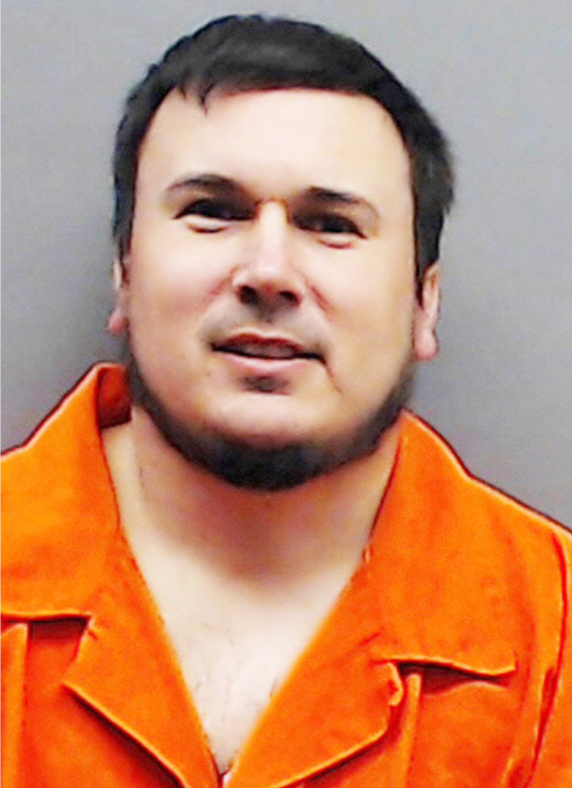Although not the first Texas nurse imprisoned for killing patients, William George Davis might top the list of convicted murderers destined to receive the proverbial “eye for an eye” punishment.

A jury on Oct. 27 took less than two hours to decide the 37-year-old Hallsville man should die by lethal injection for killing four Tyler heart patients. Evidence showed Davis caused their deaths by injecting air into their arterial systems.
“He may be one of the only people to be executed in the way he murdered his patients,” Smith County District Attorney Jacob Putman said.
The jury recommended the death penalty for Davis, who was convicted of killing John Lafferty, Ronald Clark, Christopher Greenaway and Joseph Kalina. Jurors also heard testimony that Davis is suspecting of killing three others and attempted to murder five more.
Certainly the case, which consumed seven months to investigate and 3 ½ weeks in trial, is the first of its kind in Smith County — and hopefully the last, Putman said.
“The only conclusion you can come to is someone who would do something like this would have to be cold, callous and unfeeling … heartless,” Putman said. “What he has done to these families hasn’t phased him at all. [The death penalty] is the most severe penalty that we have, and certainly Mr. Davis deserves that and more for what he did.”
The State of Texas adopted lethal injection in 1977 but didn’t execute an inmate by that method until 1982. Before then, the state utilized the electric chair or hanging. There is no recollection — at least in modern-day history — of any condemned inmate being executed in Texas by the same means he killed, a Texas Department of Criminal Justice spokesperson said.
Putman’s approach

For Putman, this is the second capital murder conviction and death sentence. In 2019 — the same year he took office — Dameon Mosley received a death sentence for fatally shooting a Tyler gas station attendant.
The district attorney said he continues to support “tough punishments for serious offenses” and takes responsibility for making the final decision on whether to seek the death penalty in a capital murder case.
“It’s obviously a very serious responsibility. We don’t take it lightly,” he said. “Every case is different and really you just have to look at the facts of the case and the evidence. I think the most important thing to look at is how do you think the jury will answer those special issues based on the evidence you have.”
In the Davis case, jurors had to decide if they believe the defendant is a continuing threat to society and if there is any mitigating evidence supporting a life sentence instead.
“I certainly have other people look at it and give me their opinion, but ultimately I am the one who makes the decision,” he said.
Putman said he also consults the victim’s family but makes sure they understand that the final decision must be based on the law and the evidence.
Public opinion
Putman’s tenure begins at a time when public support for capital punishment is experiencing a continual downward trend – reaching its lowest point in more than five decades, according to an American Bar Association’s report released in August.
A Gallup poll conducted in December showed that 55% of Americans support the death penalty, down from 60% in 2016.
Ronald J. Tabak, chair of the Death Penalty Representation Project, attributes the decline in public support to “greater appreciation of major problems with the death penalty’s implementation.”
Supreme Court rulings since 2002 have barred states from executing prisoners with intellectual disabilities or offenders who were younger than 18 when the crime occurred. Court rulings, however, have yet to favor the argument that lethal injection constitutes cruel and unusual punishment.
In Texas, public support for keeping the death penalty is still strong, but down 19% since 2010, according to the national Death Penalty Information Center. Putman said he believes Smith County residents still support the punishment in certain circumstances.
“We interview lots of potential jurors and that is obviously one of the things you talk about, is their opinion on the death penalty,” he said. “It’s been my experience the vast majority of Smith County citizens still support the death penalty.”
Some supporters use the biblical “eye for an eye” phrase to support reciprocal justice. The phrase refers to Exodus 21: 23-27: “but if there is harm, then you shall pay life for life, eye for eye, tooth for tooth …”
However, others argue the phrase is taken out of context and contend the Bible supports restricting compensation to the value of the loss … and forgiveness.

Sister Helen Prejean, an anti-death penalty activist and author, considers capital punishment a “direct legacy of slavery” and immoral not only because it disproportionately affects minorities and the poor, but also because it relies upon an imperfect justice system that cannot truly be fair.
In a 2019 interview, Prejean contended executions are a “secret ritual” conducted behind walls, in the dark of night before few witnesses. But “what the eyes can’t see, the heart can feel,” she said, in quoting Ernesto Cardenal, a Jesuit priest.
Prejean, who wrote “Dead Man Walking,” a book adapted to film in 1955, suggests public executions could be the catalyst for abolishing the death penalty. People, she said, support the death penalty in the abstract, but likely would change their mind if they faced reality.
Putman finds that an interesting concept for another reason. If executions were more public and less removed, “wouldn’t they also have more of a deterrent effect?” he asked.
The prosecutor said there are currently four indicted capital murder cases pending in Smith County.
Smith County’s presence on death row
Davis faces transfer to the Allen B. Polunsky Unit in Livingston, Texas, to await the outcome of his automatic appeal. He joins nearly 200 male death row inmates including five sentenced to die for Smith County murders. A Smith County woman is one of six female death row inmates housed in Gatesville awaiting lethal injection.
In the past two decades, 13 Smith County defendants have been executed — the most recent in 2018. During that same time period, four other Smith County death row cases were resolved — one defendant died of natural causes, one was resentenced to life, and two were released.
Andrew Lee Mitchell received a new trial and re-sentenced on a lesser offense. He was re-released in 1999 and died in 2018. Kerry Max Cook spent nearly 20 years on death row before his conviction was overturned in 1991. He was convicted of capital murder again in 1994 but won another appeal in 1996. Cook subsequently pleaded no contest to a lesser murder charge and was released for time served, but that conviction was set aside in 2016 pending a Texas Court of Criminal Appeals decision on actual innocence.
Love what you're seeing in our posts? Help power our local, nonprofit journalism platform — from in-depth reads, to freelance training, to COVID Stories videos, to intimate portraits of East Texans through storytelling.
Our readers have told us they want to better understand this place we all call home, from Tyler's north-south divide to our city's changing demographics. What systemic issues need attention? What are are greatest concerns and hopes? What matters most to Tylerites and East Texans?
Help us create more informed, more connected, more engaged Tyler. Help us continue providing no paywall, free access posts. Become a member today. Your $15/month contribution drives our work.







